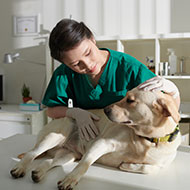Scheme aims to support owners in financial difficulties.
The RSPCA is trialling a new voucher scheme to help pet owners who need financial assistance to pay for veterinary care.
The vouchers, worth up to £250 each, are being issued by the RSPCA’s frontline officers and through food bank referrals.
When treatment costs are more than the value of the voucher, the owner is expected to pay the difference, although in some instances a local RSPCA branch or other charity may also help towards the cost.
Owners can use the vouchers towards a variety of veterinary procedures, including preventative treatments, neutering, curative surgery, treatment of ongoing medical conditions and, if there is no other appropriate option, euthanasia.
The RSPCA is contacting practices before an owner with a voucher attends, to allow an RSPCA inspector to determine the the value of the voucher that needs to be issued and arrange an appointment with the veterinary surgeon for the owner and their pet.
After treatment, practices then have 30 days to submit the voucher and corresponding invoice to the charity.
Vanessa Howie, head vet of companion animals at the RSPCA, said: “We are so grateful for the support from vets who are seeing pet-owners with one of our vouchers. There are many struggling pet owners at the moment who are facing difficult choices due to competing demands to provide for themselves, their families and their pets through the cost of living crisis.
“The RSPCA understands the importance and benefits of keeping animals with their owners, even when people have fallen on hard times, as keeping animals and their owners together during difficult times benefits both the owners and animals’ wellbeing. By supporting owners to access veterinary care we can ensure that the needs of the animals are met and their health and welfare is maintained.”
One example of a pet dog who has benefited from the scheme is Buster. He developed cherry eye when he was a puppy and as a result the condition was excluded from future insurance policies.
Buster’s owner, who was registered at a local RSPCA branch clinic, was unable to afford the cost of the corrective surgery their pet needed as the clinic was unable to carry out the procedure.
However, an RSPCA officer was able to arrange Buster’s treatment with a private veterinary practice and provide a voucher to help with the cost.
Speaking about Buster’s case, Dr Howie said: “With the voucher and a donation from the RSPCA branch, Buster was able to have surgery with his owner covering the remaining cost of treatment.
“There were no other welfare issues for Buster at home and he was able to stay with his owner. The surgery was successful and Buster is doing very well. His owner is extremely appreciative of everyone's help and immensely happy to still be with Buster.”
Image (C) RSPCA






 The latest
The latest 
